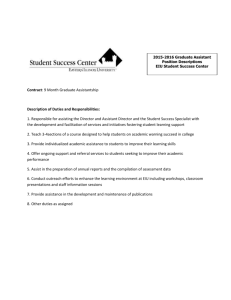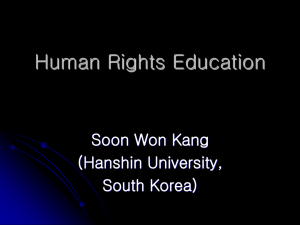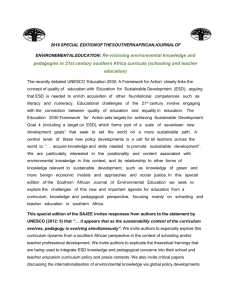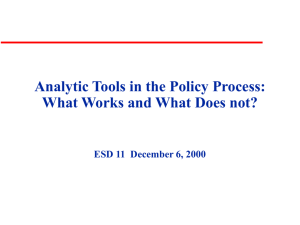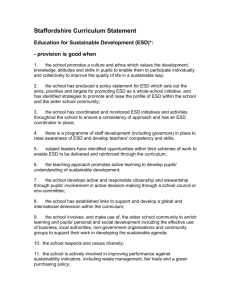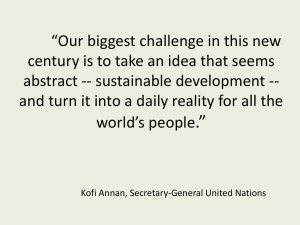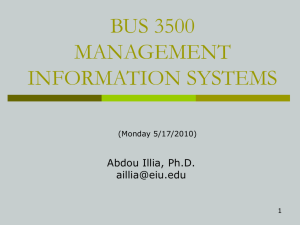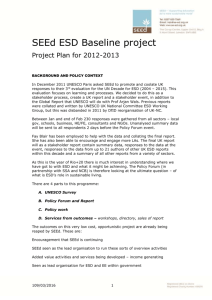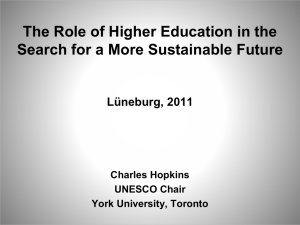What are values?
advertisement
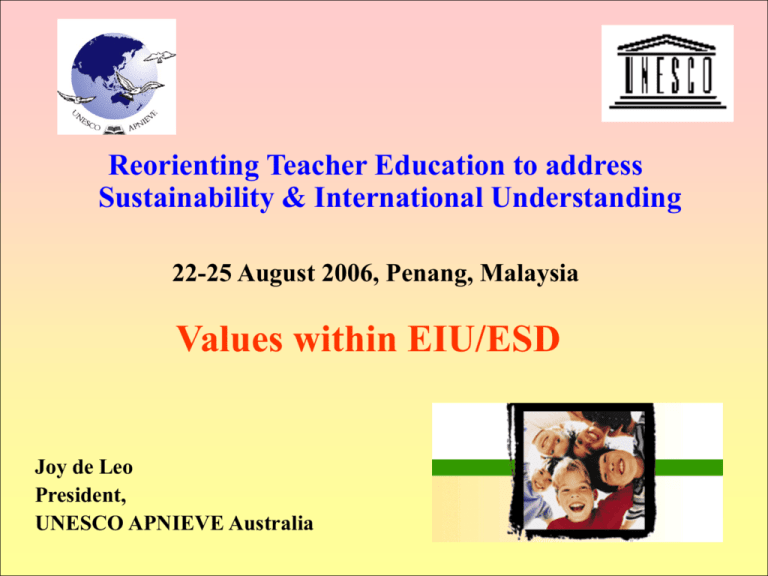
Reorienting Teacher Education to address Sustainability & International Understanding 22-25 August 2006, Penang, Malaysia Values within EIU/ESD Joy de Leo President, UNESCO APNIEVE Australia VALUES RAISE MANY QUESTIONS????? What are values? (Confusion with beliefs) Where do they come from? Types of values (Personal, Civic, Social, Environmental) Are values taught or caught? Do values change? Values implied in international instruments Values in World Faiths Are values culturally bound or are they inherent to the human condition (ie universal)? Universalism vis a vis cultural relativism Shared values – Path to a peaceful, sustainable world Unity through shared values within diversity WHAT ARE VALUES? Values are the ideals that give meaning to our lives that are reflected through the priorities we choose & that we act on consistently & repeatedly Brian Hall “Values Shift” VALUES are linked to VISION Values are powerful mental images of what we want to create in the future They reflect what we care about most & are harmonious with our values & sense of purpose The tensions we feel from comparing our mental images of a desired future with today’s reality is what fuels a vision M. Parker ”Creating Shared Vision Values-Based ESD/EIU based on Universally Shared Values These Values are implied in: International instruments and agreements (eg. UDHR) Existing publications identifying universally shared values Core Values underpinning World Faiths (A Global Ethic) Personal Qualities and Virtues advocated for millennia Eastern, western and indigenous world views These are the values we need to share to live together peacefully, inclusively and sustainably, while observing human rights and respecting diversity. Towards a Global Ethic (1993 Parliament of the World’s Religions) Affirms that: “a common set of core values is found in the teachings of the religions, and that these form the basis of a global ethic.” “Our Creative Diversity” * World Commission on Culture and Development Calls for : “cooperation based on a core of shared ethical values and principles” drawn from cultural and spiritual orientations * www.unesco.org/culture/policies/ocd/index.shtml What are these Universally Shared Values? Inherent to the human condition? May enable us to transcend cultural/religious differences: Equality, Equity, Justice, Fairness Freedom, Participation, Inclusion Peace and Non Violence Respect, Diversity, Tolerance, Acceptance, Understanding Mutual Respect – treat others as we wish to be treated (all life) Human Dignity, Individual Worth Responsibility – personal, social, civic, environmental Care and Concern for others, Compassion, Collective well being Honesty, Integrity, Transparency, Accountability Reconciliation, Truth, Forgiveness The Golden Rule - Common to Spiritual Traditions Islam Desire for your brother that which you desire for yourself. Buddhism Hurt not others in ways that you yourself would find hurtful. Christianity Do unto others as you would have them do unto you. Judaism What is hateful to you, do not to another. Confucianism Do not unto others what you would not have them do unto you. Sikhism No one is my enemy nor is anyone a stranger to me. Brahmanism Do nothing to others which would cause you pain if done to you. Taoism Your neighbour’s gain is your gain & your neighbour’s loss is your loss. VALUE LEVELS & DEVELOPMENT Foundation Values - Past Acquired from the past, these represent our basic needs as the foundation to act upon daily. These need to be strong as we fall back on them during crisis, threat or stress. Focus Values - Present Values priorities in daily lives that describe current world view, criteria for decision making, attitude towards relationships and issues, and the focus of most energy and attention Aspirational Values – Future Vision A vision of future possibility motivating us and drawing us forward towards an ideal, giving meaning to the present From Hall Tonna – “Values Shift” VALUES & SKILL DEVELOPMENT To act upon aspirational values requires : Awareness relevant knowledge understanding commitment courage appropriate skills WHOLE PERSON LEARNING WHOLE BRAIN THINKING & LEARNING VALUES EDUCATION PROCESS An Integrative Pedagogy for the Whole Person An integrative, holistic methodology brings together: cognitive – intellect – knowledge & awareness affective – emotions – attitudes, values behavioural - physical skills – actions & behaviours spiritual – inspiration – commitment to transform & to bring about change (all) The APNIEVE Teaching and Learning Cycle Cognitive Level KNOWING about oneself and others; their behavior, culture, history, country, etc. ACTION UNDERSTANDING non-violent conflict-resolution oneself and others, concepts, decision-making, key issues, and processes Behavioral level Conceptual level VALUING experience-reflection accepting, respecting, appreciating oneself and others Affective Level W.I.S.E. MODEL – Map for the Process of change W.I.S.E. Model – Wholistic Integrated Science & Education Research Institute Learning to Transform Learning To Lead Strategic Thinking PRINCIPLES Learning To Be Reflective Thinking AWARENESS 8 Learning To Know Critical Thinking KNOWLEDGE Learning To Create Creative Thinking VISION 1 Learning To Learn Grow, Develop Constructive Thinking ETHICS 7 2 3 6 5 Learning To Do Applied Thinking SKILLS Learning To Care Relational Thinking UNDERSTANDING 4 Learning To Live Together Harmonious Thinking VALUES INTEGRATED approach to ESD/EIU Integrating Values across the curriculum: Vertically for all ages, from birth to the final year of schooling, using pedagogical approaches appropriate to the age group Horizontally across all subject areas, by reflecting the values and taking a systems, transdisciplinary approach There are considerable implications for education policy, curriculum development, pre service/in-service teacher training, for teachers to integrate values across subjects and learning areas for a holistic, integrated approach Transdisciplinary Approach Based on Universal Values & Principles Values-Based ESD/EIU Education based on Fundamental Human Values implied in international documents Values reflected across the whole school in: • • • • • • all school policies and guidelines the behaviour of students, teachers, school staff & parents the articulated school mission, purpose and values the curricula and learning materials in all subject areas the teaching/learning process, methodology, pedagogy the whole school culture and environment Integrating Values into the school environment by: • integrating learning thematically across curriculum • quality of respectful relationships within the school • school rules, guidelines, policies, administration & decision making processes, reflecting the shared values of the school community • interface with the surrounding local culture & all aspects of community life • community partnerships - taking responsible civic action together for a caring community • inviting local community members to speak at school • using various forms of media & information technology • undertaking community projects Implications for Teacher Training • • • • • • • Awareness & focus on one’s own values development Ability to identify, clarify, develop and live the values Understand the Values formation process & apply it Ability to guide & facilitate learner values development Develop skills in appropriate teaching/learning processes a& methodologies to integrate relevant values in school curricula, classroom practice & across the whole school Develop communication, values clarification & consensus skills with students, parents & community Awareness of available materials & resources & ability to develop resources relevant to Values for ESD/EIU Reorienting Teacher Education to address Sustainability & International Understanding 22-25 August 2006, Penang, Malaysia Values within EIU/ESD Joy de Leo President, UNESCO APNIEVE Australia
